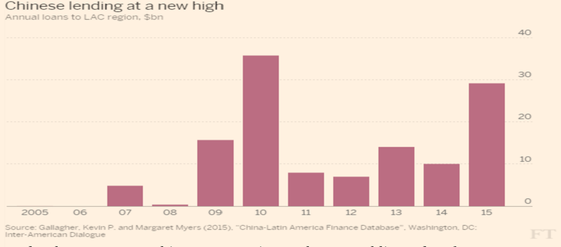2015 has been a very tough year for South American countries. As a matter of fact, the recessions that many of these countries experienced in the previous year led economists to label this event as the “South American Financial Crisis”. Most of these countries rely heavily on exports and with the collapses in the prices of commodities such as Nickel, Bronze, and Zinc, these countries are really in for a rough time. Another source of the issue is the US Dollar denominated debt that they have accumulated over the years which now is becoming even harder to pay off. An example is Argentina, which was particularly hardly hit and as a result was forced to announce a default to its debt holders in early 2015.
However, one country has come to the rescue for these troubled nations as their lender of last resort: China. According to Silvia Pavoni, a columnist for the Financial Times, the China Development Bank and the China Export-Import Bank have lent a total of “29.1bn” to these countries in 2015 alone (FT.com). Venezuela has been the country for now that has received the largest portion of the funding in order to invigorate its energy related investment projects. Argentina too has engaged in a “bilateral agreement on economic co-operation and investment with China” (FT.com). Transfers of funds of this degree may not seem to be a complicating issue at first, so why are analysts and policy makers worried?
However, one country has come to the rescue for these troubled nations as their lender of last resort: China. According to Silvia Pavoni, a columnist for the Financial Times, the China Development Bank and the China Export-Import Bank have lent a total of “29.1bn” to these countries in 2015 alone (FT.com). Venezuela has been the country for now that has received the largest portion of the funding in order to invigorate its energy related investment projects. Argentina too has engaged in a “bilateral agreement on economic co-operation and investment with China” (FT.com). Transfers of funds of this degree may not seem to be a complicating issue at first, so why are analysts and policy makers worried?
What the analyst points out is the interesting fact that China historically has lent funds to countries that “can simply match its demands for natural resources” (FT.com). This indicates that the lender would always seek their own involvement in the country’s operations to advance its own interests as well. Moreover, the concerning part is nature of the agreements that have been struck among the 2nd largest economy in the world and these countries. The agreements in Venezuela pertain to energy investment projects for which China will play a leading role. In Argentina instead, the bilateral agreements allow China to “bypass public tenders for infrastructure projects” and “the two governments can sign additional agreements to launch public work projects without approval in Argentina’s congress” (FT.com). These conditional transactions unbound China in its future operations and allow it a free reign for its endeavors in the region.
Cosimo Bocchi
Cosimo Bocchi
